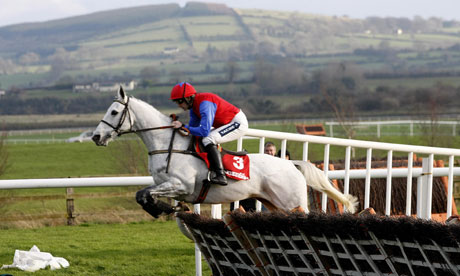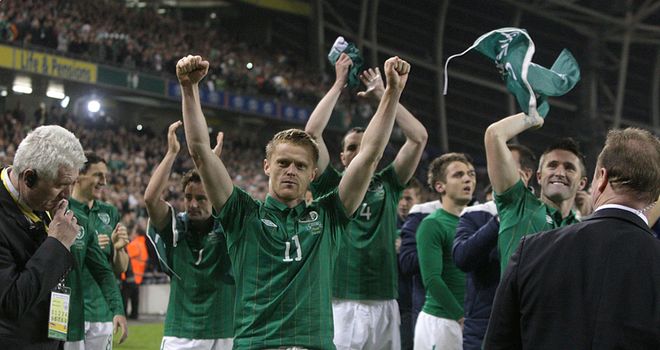 |
| Thousand Stars on his way to victory in the Morgiana Hurdle (c) guardian.co.uk |
SANTA Claus made an early visit to Punchestown’s Winter Festival on Sunday and his sleigh was full of Christmas gifts for Ruby Walsh, Willie Mullins and the racegoers who enjoyed some top class racing underneath a bright winter sun.
The only people who weren’t on Santa’s Christmas list were the bookies. They were reeling by the end of the day as six of the seven favourites obliged.
It was a star studded weekend for Ruby Walsh who followed up Kauto Star’s magnificent and emotional triumph at Haydock on Saturday with a treble here, including the feature Morgiana Hurdle on Thousand Stars.
The grey’s trainer, Willie Mullins, has been in scintillating form recently with two trebles last week but he out did himself with four winners on Sunday. His champion hurdler, Hurricane Fly, was due to make his seasonal reappearance in the Morgiana Hurdle but Mullins was forced to rule him out of the race on Wednesday.
Thousand Stars spent much of last season chasing his illustrious stablemate’s shadow but he proved himself a more than capable deputy as he led from pillar to post under Ruby Walsh.
It was an impressive performance by the pair. They set off in front and Ruby let Thousand Stars bowl along at the head of affairs. He never saw another horse during the two miles and crossed the line five and a half lengths clear of Oscars Well. It was a much deserved victory for Thousand Stars who came into the race with the best form, having been placed in the Champion Hurdle here and at Cheltenham behind Hurricane Fly, and just failing by a nose to land the Aintree Hurdle.
Afterwards Mullins paid tribute to Thousand Star’s consistency. “He runs up to his mark every race and has earned a lot of money being placed in Grade Ones last year and he picked up a Grade One in the end. He is some servant to have and I wouldn’t mind a few more like him.”
The grey was adding a second Grade One victory to the one he claimed in the French Champion Hurdle and a return to Auteuil in June is on the cards for him. “He’ll be entered in everything. He’s good enough to run in the Champion Hurdle but he’ll certainly get an entry in the World Hurdle. Going back to France will be the main aim for him this season,” said Mullins.
“He had a lot in hand over the other horses and I was fairly confident coming into the race. He’s a very good horse in his own right but he’s been in Hurricane’s shadow a long time. He’s a versatile horse and a good jumper of hurdles. He’s a nice horse to own,” added winning jockey Ruby Walsh.
The day started with the first of Walsh and Mullins’ presents to the punters as red hot favourite So Young obliged in impressive fashion in the Paul Carberry Autobiography Hurdle. He ranged up to long time leader Fully Funded on the run to the second last and took it over jumping that flight and forged clear to win in a canter.
Mullins was pleased with how So Young strengthened up over summer but the victory has left him with a dilemma over where to go next. He has an entry in the Hatton’s Grace at Fairyhouse on 3 December but the trainer isn’t keen to take on the country’s top hurdlers so soon after running in the testing ground.
“He looked a stronger horse than last year. I’m very pleased with that. We’ll see how he comes out of it but we might be looking at the three mile hurdle at Leopardstown at Christmas.
“He will be a very hard horse to place but we will be aiming him towards the bigger festivals in the spring but I’m not sure what path we are going to take at this time.”
There were never any doubts in punters’ minds about the winner of the Ladbrokes.com Mobile App Handicap Hurdle. Ruby Walsh treated racegoers to a masterclass in holding tactics. He held Dare to Doubt up in rear and stealthily crept forward down the back straight to come between the leaders rounding the final bend and take over the lead going to the last.
Mullins revealed that a change in tactics had brought about big improvement in the filly. “That was a great ride by Ruby. We changed tactics with her this year. She was breaking her heart from the front so we decided to settle her in behind and it’s worked.”
Michael O’Leary was another who Santa brought some early presents for. His Gigginstown House Stud owned three winners, including the aptly named Make Your Mark who landed the bumper in fine style in the hands of Patrick Mullins. It was his father’s fourth winner of the day and Make Your Mark will get the chance to do that over hurdles next as he is set to go novice hurdling.
Patrick was pleased with the horse’s performance and hoping that his father’s winning run will keep going. “He was a little keen early on but he will probably be a stayer on better ground. They are flying and Dad has them in great form. Hopefully they will stay that way till Christmas.”
Davy Russell delivered O’Leary’s other presents. On a day of multiple winners he too got in on the act with a double. Dedigout won the maiden hurdle in O’Leary’s colours for trainer Tony Martin.
Last Instalment was an easy winner of the Grade Two Florida Pearl Novice Chase. Russell tracked the pace setting Four Commanders. He took over the lead on the run to the second last fence and Last Instalment galloped clear on the run in.
Trainer Philip Fenton was delighted with Last Instalment’s win. “I’m pleased all round. That was just perfect. He ran round and jumped well. He takes it all in his stride and I couldn’t have asked for anything more for him today.”
Future plans for Last Instalment are ground dependent. “Cheltenham is the dream but we are a long way away from that. Soft ground is important for him and we will have to feel our way with him.”
The day’s other Grade Two event, the Craddockstown Novice Chase was the only race not to be won by the favourite. Days Hotel made an eye catching start to his chasing career here last month and Henry de Bromhead’s charge followed up the promise of his debut victory.
The finish looked like being a battle to the line with favourite Lucky William as both horses jumped the last together but Days Hotel forged clear on the run to the line, with Lucky William six and a half lengths adrift in second.
Days Hotel’s victory didn’t even bring some early Christmas cheer to the bookies as he was a well backed second favourite.
* This article first appeared in The Nationalist on 22 November 2011
* This article first appeared in The Nationalist on 22 November 2011











